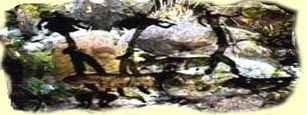Introduction
“Who among us has not dreamed, in his ambitious days, of the miracle of a poetic prose, musical, without rhyrhm or rhyme, supple enough and harsh enough to adjust to the lyric movements of the soul, to the undulations or reverie, to the sudden starts of consciousness?”For much of my life I've been preparing for a project that has no destination, and as most of my work during the past twenty years has been in the form of a journal, I want to take this work on a walk for the sake of walking about the rugged trails of existence-non-existence, switchbacking between the sacred and profane.
Biologist H.H. Pattee said, “I feel that the evolution of living systems has not tended towards greater and greater complexity necessarily; rather, in the sense of function, it has always led to simplicity.” When we evoke language, we are confronting a living system that by whatever means possible, tends to speak. Then, honing an abstract simplicity, we enter the the style of old age, no matter what age we happen to be.
What continues is my trope of invagination: a fragment of text planted within the paragraphic body, interrupting its continuity and disturbing its literal meaning.
For the making of images, I've adapted the palimpsest, a technique used in Paleolithic cave art made over thousands of years, now a digital algorithm.
There is some irony in drawing the periphery of a book on a monitor, as the machine it illuminates offers so many other playful opportunities. Contrary to the field of New Media, which is expanding, including its theories and critiques, this project defines a constricted space, like an archaeology that cordons off a plot, then cautiously begins to dig.
When the physicist F. David Peat heard his first lectures on quantum theory, he was "not really that interested in learning how to calculate the spectrum of hydrogen. Instead I wanted to know what the theory really meant."
"Seize the image before the content!" James Hillman
In this postmodern era, meaning has been sublimated into probabilities. While metaphor, "as it perceives likeness, not answers," leads us toward a way of being, in which—
I sit in the withered beauty
Of wild grasses.
